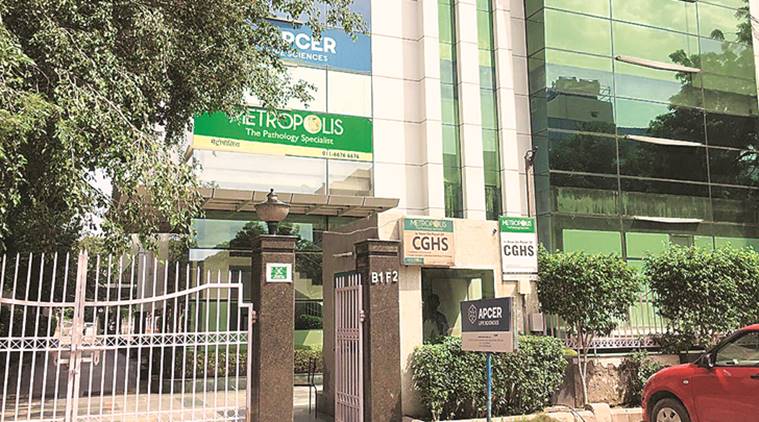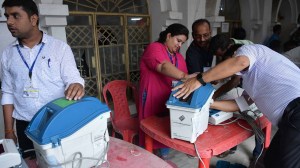- India
- International
Big tech firms had e-waste centres but only on paper, many addresses fake: Delhi probe
The Indian Express has learnt that when the DPCC inspected 43 out of a list of 80 centres sent to them by the CPCB, at least 20 e-waste collection centres of multinational giants, including Samsung, HP, Canon and Vivo, were found either untraceable or non-existent.
 Plot in Mohan Cooperative Industrial Area in South Delhi listed as an e-waste centre by Vivo. It was found to house a pathology lab and a healthcare research firm. (Express photo by Shivam Patel)
Plot in Mohan Cooperative Industrial Area in South Delhi listed as an e-waste centre by Vivo. It was found to house a pathology lab and a healthcare research firm. (Express photo by Shivam Patel)
Retired civil service officer P K Seth has lived at his Lajpat Nagar home for 67 years. So he was naturally surprised when asked if an electronic waste collection centre had been running from the premises.
The reason: in a list of e-waste collection centres sent to the Delhi Pollution Control Committee (DPCC) by the Central Pollution Control Board (CPCB) earlier this year, Seth’s house was listed as one such centre meant to collect e-waste from multinational technology firm Vivo.
“I have been living here since 1952 and there is no way waste recycling or collection could happen here,” Seth, 74, said.
The Indian Express has learnt that when the DPCC inspected 43 out of a list of 80 centres sent to them by the CPCB, at least 20 e-waste collection centres of multinational giants, including Samsung, HP, Canon and Vivo, were found either untraceable or non-existent. The inspection was carried out over May and June this year.
The non-existent or untraceable centres were part of an e-waste management plan submitted by electronics giants to the CPCB.

The Indian Express accessed a list of 10 such collection centres, of which only one could be found at its stated address.
“They either had incomplete addresses or were listed in residential areas where they could not exist and were simply untraceable. We have informed the CPCB about this,” a DPCC official said on condition of anonymity.
Consider this:
-An address listed as a collection centre for Vivo in Mohan Cooperative Industrial Area in south Delhi was found to be a building that housed a pathology laboratory and a healthcare company.
Vivo has claimed this address was operational until February and that the CPCB was informed about its closure after that.
-Of the three addresses listed by Samsung as its centres, two had incomplete information and a third one was inside a warehouse that shut nearly two months ago.
The company sought approval for an address in North Delhi’s Alipur that only mentioned the plot number and the area, with no mention of the road name, landmark or pin code.
-Another address in East Delhi’s Veer Savarkar Marg had the plot number missing, which made it difficult to trace its exact location.
-Of the three addresses mentioned in DPCC’s list as HP collection centres, one mentioned only the plot number and the city name, without listing the area, road name or pin code. HP said they provided the full address to the CPCB and that the list features an incomplete address.
-Another address, which HP claimed was not part of its Extended Producer Responsibility (EPR), was listed at Old Mustafabad in East Delhi. However, the location could not be traced during a spot check as the plot number could not be found.
-The tenth collection centre on the list, mentioned by Canon, was traced by The Indian Express. However, the owner of the shop, Aarif (40) said he has tied up with a company that brings e-waste to him and takes it back again for recycling. “I have had this shop for around eight years and have not received Canon products so far,” he said.
-At another Vivo location in Lakshmi Nagar, multiple electronic dealers said they were not aware of any e-waste collection centre existing at the listed address.
Mohit Jain, a mobile phone shop owner, said, “An inspection was carried out by state officials around two months ago but even they couldn’t find the address.”
According to officials, a “loophole” in the E-Waste (Management) Rules 2016, amended in 2018 to introduce collection targets, could be the reason behind the problem.
The rules state that every producer of Schedule 1 electronic products, such as computers, mobiles, television and refrigerators, has to submit an EPR plan to the CPCB for approval.
The CPCB then evaluates the plan submitted and gives authorisation on being “satisfied” that the producer has detailed an effective system.
After approval, the CPCB forwards the EPR to state pollution control boards for monitoring, which means that a plan could initially be approved by the CPCB without a field audit. If a producer changes its EPR midway, it has to inform the CPCB about it. Producers can also collect products of other electronic companies to meet their recycling targets.
A Vivo spokesperson said its Lajpat Nagar II collection centre was operating until May 31, something that the owner of the house, Seth, denied. Two other addresses were closed down in February and they had informed the authorities about it, a Vivo spokesperson said.
The Vivo spokesperson said, “We have received an appreciation from the government of India for complying above the industry standards for our e-waste initiatives. We have overachieved the e-waste target suggested by the government.”
HP said two collection centres inspected by the authorities were not part of its EPR plan. “The third was listed as incomplete in the CPCB report even though HP had submitted the full address,” said a statement by the company.
A Samsung India spokesperson said, “Samsung complies with the laws of the land. The three locations in question have no connection with Samsung.”
Canon was unavailable for comment.
Apr 19: Latest News
- 01
- 02
- 03
- 04
- 05






































